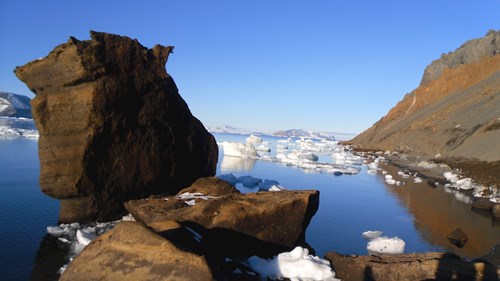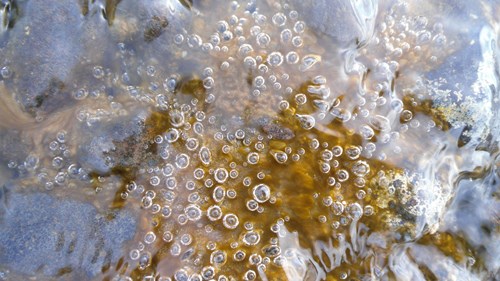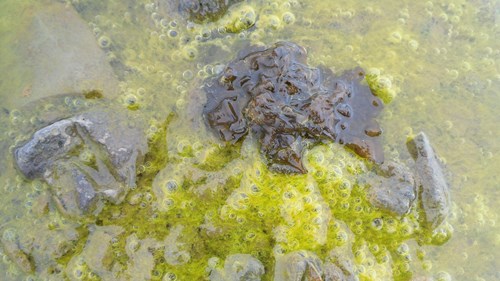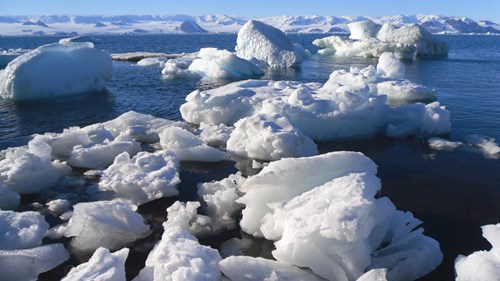Why is it so crucial for us to explore Antarctica? How is your research at RECETOX related to Antarctica?
There are many reasons. The most crucial one is climate change. Polar regions are sensitive to climate change. Long-term temperature increases significantly impact Antarctica. They cause the retreat of glaciers and the associated rise in sea and ocean levels which affect the composition of flora and fauna and the overall biodiversity of Antarctic ecosystems in the long term. By monitoring and understanding these processes, we can predict future evolution. From my point of view, without monitoring changes in taxonomic and genetic diversity, humans may lose information on many species of organisms living in Antarctica, but also information leading to the discovery of new antibiotics or substances useful in the treatment of various types of cancer.
One part of my research at RECETOX focuses on toxic (but potentially useful) biologically active compounds produced by Antarctic cyanobacteria. I am currently working with colleagues from other MU departments to develop the Czech Antarctic Microbial Biobank (CAMB). CAMB will help establish new collaborations and systematize our scientific results. The biobank is based on the results of our long-term research and divides into a culture collection, which contains algae, cyanobacteria, bacteria, fungi, and viruses, and an environmental part, which serves, among other things, for biodiversity conservation and its long-term monitoring.
How did you become part of the 2015 expedition?
During my undergraduate studies in Prof. Bartak's group, I was interested in the polar regions, where I worked on Antarctic cyanobacteria and algae physiology. Of course, I was eager to go to the polar areas, try out fieldwork and implement my own ideas. In 2014, my application to the Polar Ecology Course organized by the University of South Bohemia in Spitsbergen (Arctic) was successful. I learned how to navigate the polar regions properly and adequately collect and transport samples. With this experience, I decided to try the MU Ph.D. students' tender for the 2015 expedition to Antarctica. And eventually, I became a member of the expedition and implemented my own scientific ideas in Antarctica.

What must a scientist do before such an unusual expedition?
From a health point of view, the essential thing is, of course, a medical examination to ensure that the scientist is fit for physically demanding work. For our expedition, we also had to take stress tests. For work, it is crucial to have a very detailed plan of all processes in advance (at least 4 months or more before departure) what a scientist will do in Antarctica. If you need any specific equipment, it must be sent to the station in advance, along with any other excess cargo.
What was the goal of the expedition?
Our expedition was the 10th in a row, so many of the goals were already built on work from previous years. Long-term climate monitoring is ongoing on James Ross Island, where the Czech Scientific Station of Johann Gregor Mendel is located. Year-round measurement equipment is deployed at various locations on the island and requires annual maintenance and data collection. Other long-term research, for example, monitors the physiological activity of photoautotrophic (photosynthetic) organisms at specific locations. In addition to these long-term studies, various scientists have also focused their attention on the colonization of seal corpses by diatoms, the measurement of mercury concentrations in multiple matrices, and the effect of living in Antarctica on the human immune system.
What were your main tasks on the expedition?
My main goal was to collect samples of microbial growths, mainly cyanobacteria, bacteria, and algae, from as many different types of environments as possible, such as lakes, streams, wetlands, seasonal ponds, or cryoconite (special ecosystems that form on glaciers surfaces). It was also crucial that the samples came from as many different places on James Ross Island as possible. In total, I managed to collect just over 100 pieces. These samples were taxonomically analyzed and prepared for transport to the Czech Republic. In addition, I assisted colleagues on other projects.

What methods did you use to collect scientific data in such unusual conditions?
As my main task was to collect samples, record the sampling conditions, initial analysis of the samples and their proper preservation, my work was not particularly complicated: I worked only with sterile tubes, equipment for measuring temperature, pH, conductivity, and GPS, as well as a microscope, freezer, and laptop for recording. So, nothing complicated. The exact science, in my case, didn't begin until I arrived back in the Czech Republic.
What was the biggest challenge for you during your stay?
The biggest challenge was participating in the expedition itself. If we focus on the scientific level, I started my Ph.D. studies in 2015. So, I was aware that I had a huge opportunity to kick-start my scientific career in the right direction. So, a big challenge was to make my project as responsible and high-quality as possible. Personally, it was a huge challenge, as the possibility of contact the outside world, including your immediate family, is minimal during the 2 months you are in Antarctica, so you must be resilient physically and mentally.
How much did this expedition influence your scientific work?
As I mentioned, it was a huge opportunity, and in retrospect, I think I used it quite well. Based on my follow-up research studying novel specialized metabolites from Antarctic cyanobacteria, I was granted the prestigious Australian Endeavour Research Fellowship 2017 - the Australian government-funded my 6-month internship in a top laboratory in Australia, led by one of the top experts in the field, Prof. Brett Neilen (H-index = 82). I learned a lot there and then developed unique expertise in researching interesting metabolites of microorganisms. Apart from that, my experience in both polar regions also made me very active in popularizing science, so I have been bringing the polar regions to a broad audience, from primary school students to seniors at the University of the Third Age.

What is the current topic of your scientific work?
I am currently working in the team of Doc. Hilscher, who was also my dissertation supervisor. I am developing methods for detecting new substances from environmental mixtures in her team. I am also still working on my Antarctic project. As I mentioned, I am currently developing a CAMB for which I have isolated >10 species of Antarctic cyanobacteria and several algae and processed approximately 70 environmental samples from my samples. I am also working on the characterization of Antarctic microbial communities and their potential for new drug discovery. Recently, I have also applied for the Marie Skłodowska-Curie Action - Postdoctoral Fellowship (MSCA-PF) at Prof. Ziemert's group in Tübingen, Germany, where I would focus on "(meta)genome mining" of Antarctic microbes, i.e., the use of genetic information of Antarctic organisms for the discovery of new specialized metabolites. My project focuses on discovering new antibiotics, which are currently much needed, mainly due to the increasing resistance of microorganisms to antibiotics already in use.
Is it true that polar bears do not live in Antarctica? And what can you do in Antarctica in your spare time, apart from building snowmen - if there is any spare time left.
It is a popular question in primary school. It is indeed true that there are no polar bears or any other bears in Antarctica. But there are plenty of penguins. As far as free time is concerned, it is true that there is not that much of it. Still, if you have a lot of free time after a challenging off-road hike, and believe me, 40 km in 1 day in Antarctica will tire you out a lot, so you need to have the second day free. Such days come with reading literature, writing reports, shorter walks around the station, or possibly an evening chess game with colleagues.
Ludek, thank you very much for the exciting interview and photos from your stay on James Ross Island. Fingers crossed that everything goes well.











